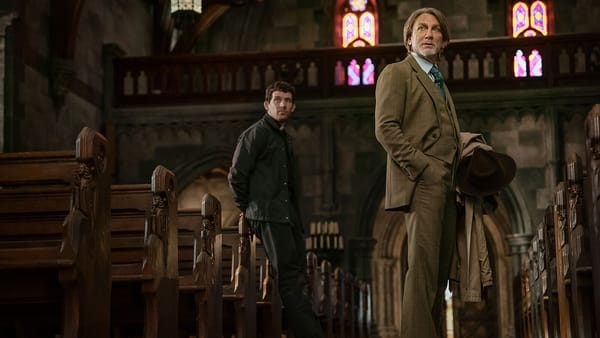Today on Project Gutenberg: "The Lieutenant and Commander"
Fragments of a voyaging life.
Today on Project Gutenberg, we have...
The Lieutenant and Commander by Basil Hall
If you study the history and culture of Britain in the 18th/early 19th centuries, two things will become very clear almost at once: Brits in that time period loved their Navy, and they loved travel literature. And they really loved combining those two things.
During the Napoleonic Wars and the years surrounding them, it was common for educated Royal Navy sailors to keep journals of their experiences at sea and to later publish these journals back in Britain. Men like George Anson, James Cook, William Parry and Frederick Beechey were widely read by the British public, who delighted in the stories of their journeys to the far reaches of the globe.
One such sailor who followed in this tradition was Basil Hall. The son of a Scottish baronet, he served with the Navy from 1802 to 1823. During those two decades he attained the rank of captain, served in the Napoleonic Wars, later interviewed Napoleon himself and traveled all over the world. Countries he visited include China, Korea, the island of Java (now part of Indonesia), Chile, Peru and Mexico.
Today's book, published in 1862, is an abridged section of The Fragments of Voyages and Travels, Hall's longest and most successful publication; the original volumes date back to the 1830s, and Hall himself died in 1844. According to the unnamed editor, it "comprises all the chapters of the second and third series, only slightly abbreviated..."
That means there is a lot we can potentially go over here. To keep this post relatively brief, I will single out a few chapters that I selected to read in full:
Chapter 1, AKA "Taking a Line in the Service"
This opening chapter may be dense and full of nautical terminology, but it demonstrates Hall's ultimate purpose as a writer: to guide and educate the current and future young sailors of the Royal Navy.
To "take a line," as Hall says, means to identify what trajectory you want your naval career to have and which skills to practice in pursuit of that goal. Some sailors will decide to focus on the nitty-gritty details of running a ship: tying knots, cutting sails, making repairs, springing into action when there's a fire or a storm, etc. "Such may be called the muscular parts of our body nautical," Hall writes, "...and when handled with skill, they form the stout instruments which help essentially to win such battles as the Nile and Trafalgar." Other sailors will take up more intellectual pursuits, learning the rules of the Navy and the science of sailing and navigation; they are more likely to become officers, captains and even statesmen. Many young men will be subconsciously drawn to one career path or another, but Hall encourages his readers to be deliberate about it:
Hall concludes the chapter by expressing the hope that his memoirs will share with young readers "a portion of that spirit of cheerfulness, and that resolute determination to make the most of things, which, after thirty years of activity and enjoyment in foreign climes, have landed me in perfect contentment at home."
Chapter 5, AKA "The Tropical Regions at Sea"
This chapter encompasses part of a voyage Hall made to the Indian Ocean in 1812, escorting a fleet of East India Company ships as they made their way to China. It's quite dry to modern readers, with lots of blocky paragraphs, run-on sentences and scientific terminology. See, Hall is fascinated by how the fleet encounters different weather conditions based on its closeness to the poles and the equator. He describes departing England during a cold March, then observing the gradual rise in temperature as he neared the Tropic of Cancer. After passing the equator and the Tropic of Capricorn, the voyagers "again became conscious of the weakened influence of the sun; till, at length...we were once more nipped with the cold. Anon, having rounded the southern point of Africa, we put our heads towards the line, and a second time, within a few weeks, emerged from the depth of winter into the height of summer."
This section is interesting, but the part I want to single out is Hall's wonder at seeing the sky from the Southern Hemisphere from the first time:
Chapter 18, AKA "Excursion to Candelay Lake in Ceylon"
This chapter describes part of a visit that Hall made to the island of Ceylon (modern-day Sri Lanka) sometime between 1812 and 1815. The commanding admiral of his fleet, Sir Samuel Hood, took him along on an excursion to see the artificially made Candelay Lake, known today as the Kandalama Reservoir. Thus ensues the sort of antics and observations you'd expect from a 19th-century European writing about a place he doesn't understand or respect.
Hall's mentions of the native Sri Lankans encountered by the group range from uncomfortable (treating them like either servants or a source of entertainment) to kind of funny (getting kicked out of a temple after unintentionally insulting some villagers). He devotes most of the chapter to describing the flora and fauna of the region, and at least in that regard, he does seem to realize how he and the other Europeans are out of their depth. At one point the group nearly crosses paths with a wild elephant in the middle of the night, and despite Hall's assertion that they were "contented with the risk," there's a genuine undercurrent of tension and fear in how he writes about the incident. Imagine hearing thundering footsteps in the dark, not seeing where they're coming from, and then realizing you don't have the means to scare the creature away if it heads towards you. Hall writes about the dense forests of Sri Lanka with a similar wary fascination:
In conclusion, this is not the sort of book to pick up if you're unfamiliar with the works of this time period and genre, or if you just want a little light reading. But if you're the kind of person who likes stories from the Age of Sail, whether real or fictional, Hall's memoir offers a detailed and personal look at that lively period of history.
And that's what we found today on Project Gutenberg! See you next time!
—Dana





